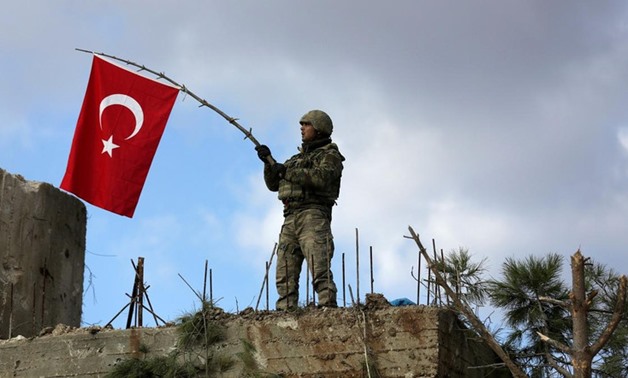
A Turkish soldier waves a flag on Mount Barsaya, northeast of Afrin - REUTERS
CAIRO – 19 March 2018: Fifty-eight days after Ankara instigated a brutal and multifaceted campaign against the Kurdish People's Protection Units (YPG), the Turkish army and its allied mercenaries have raised the Turkish flag in Afrin city centre. The symbolic move only serves to confirm that Turkey’s expansionist drive, thrust forward under Erdoğan, is achieving its goals.
Erdoğan’s confidence in using military pressure to advance his expansionist aims were largely born out of the Syrian civil war, where perceived threats to Turkish national interests became paramount and a reliance on hard power has become commonplace. The Turkish army’s operations in Syria have seemingly introduced a growing air of confidence in Ankara, leading to a resurgent breath of belligerence by Erdoğan. Turkey’s foreign ambitions have taken the front seat, with the state looking inward for support and legitimacy.
However, the question remains: why has Erdoğan embarked on a path which favors an independent and brazen foreign policy, with little pragmatic concern for regional alliances? Much like “Resurgent Russia” and their push to re-establish themselves as a global power, there is a desire in Turkey to reclaim its position as a major regional state. For many decades Turkey has been deeply investing in forging ties with the “West,” and has been under intense scrutiny from Western allies to follow status quo.
Contrary to global norms, Erdoğan dreams of Turkey returning to a leading global position, as was held during the Ottoman Empire. This means that territorial expansionism is a fundamental aim and Erdoğan has led the country to believe it has a duty to expand. Yet, this expansion comes at the cost of the national sovereignty of Turkey’s neighbours with national security as the justification, and Syria is just the starting point. Expansion requires a strong military force, and it will put Turkey against powerful competitors with actionable alliances.
Turkey’s aggressive stance in Syria illustrates a deep hypocrisy in its foreign policy. Turkey has long put forth a starkly anti-Israeli rhetoric and regularly threatens the Israeli state on account of its military activity. However, Ankara will find it increasingly challenging to criticise Israel for defending itself while the Turkish army and its allied forces raise the Turkish flag in Syrian territory.
Like Turkey, Israel’s main concern is border security, particularly given the threat posed by Iran and Hezbollah in Lebanon and Syria.
As the war drags on in Syria, fighting has begun to stray closer to the 1974 armistice line, where Israel is determined to prevent Iranian-backed Shiite militias and Hezbollah from advancing and constructing military installations. As the conflict has evolved, Israel is less threatened by Islamic jihadist groups such as ISIS and its affiliates, and more by Hezbollah and Iranian-backed Shiite militia. These are groups who Israel fears may establish permanent bases on its border as conflict abates. Not only would Iranian advances towards this line open up a new hostile front on the Israeli-Syrian border, it would consolidate a Shiite belt stretching from Iran to the Mediterranean that would pose a risk to stability in the region.
Israel’s defensive stance is distinctly different to the aggressive expansionist tendencies of Ankara, where actions are reinforced and justified in the name of “national security”. While Turkey will find it increasingly difficult to criticize Israel on account of its involvement in Syria, in turn Russia will also struggle to defend its policy. Moscow has always stressed the importance of respecting Syria’s territorial integrity, and is legally justified in denouncing the involvement of foreign actors in Syria. However, even a bird needs Russian permission to fly over Syria these days, and it is certain that Turkey was granted permission by Russia to conduct its campaign against the Kurds in Afrin, in what is a clear violation of Syrian territorial sovereignty.
There is also the feeling that Damascus and its Russian-Iranian partners have used Afrin as a chip in a nation-wide game and gamble for territory. It is possible the regime conceded Afrin to the opposition as part of a deal which saw the regime take control of Eastern Ghouta. Both campaigns seemed to intensify concurrently, and there was insubstantial opposition from state actors.
On a final note, a crucial point regarding Turkey’s occupation of Afrin is highlighted by Max Abrahams, assistant professor of Political Science at Northeastern University and world-renowned terrorism scholar.
While Turkey’s brutal campaign in Afrin is fitting with its anti-Kurdish discourse, it does little to soften claims that Turkey has supported ISIS in Syria. Turkey’s permeable border with Syria has allowed jihadist fighters to cross with relative ease, and it is alleged that Turkey has been a major recipient of oil from the militant group.
If Turkey had directed its military to counter the threat posed by ISIS in Syria, then the struggle against the brutal jihadist group may be short-lived. Not only that, but the Turkish military is currently engaged in fighting an emboldened YPG, which may have not gained such confidence if it was not the principal actor on the ground in the face of ISIS.
It is likely that Turkish forces will push east in order to consolidate a belt of territory on its Syrian border. If Manbij is won and Kurdish forces are pushed east of the Euphrates, the victory over Washington would be greater than that over the Kurds, and would alienate Turkey further from the U.S., the West, and the Syrian government. The Syrian government has previously said it will resolve the Kurdish question in Syria after conflict in the country has subsided. However, a confident Erdoğan is trying to shape the future in the north of the country, and without an effective opposing force, he will likely succeed to control Afrin; while east of the Euphrates will prove a different story.

Comments
Leave a Comment